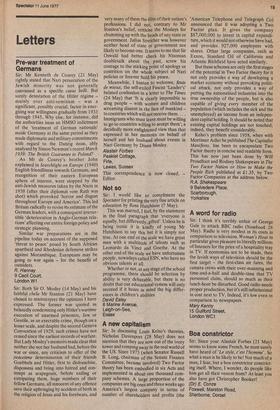Pre-war treatment of Germans
Sir: Mr Kenneth de Courcy (21 May) rightly stated that Nazi persecution of the Jewish minority was not generally canvassed as a specific casus belli. But surely detestation of the Hitler regime — mainly over anti-semitism — was a significant, possibly crucial, factor in energising war willingness gradually from 1933 through 1945. Why else, for instance, did the authorities issue an HMSO indictment of the 'treatment of German nationals' inside Germany at the same period as they made diplomatic and military commitments with regard to the Danzig issue, ably analysed by Simon Newman's recent March 1939: The British Guarantee to Poland?
As Mr de Courcy's brother John explained in Searchlight on Europe (1940) English friendliness towards Germans, and recognition of their eastern European sphere of interest, were stopped by the anti-Jewish measures taken by the Nazis in 1938 (after their diplomat vom Rath was shot) which provoked 'horror and disgust throughout Europe and America'. This led Britain radically to revise its estimate of the German leaders, with a consequent irreversible 'deterioration in Anglo-German relations' affecting our entire foreign policy and strategic planning.
Similar war preparations are in the pipeline today on account of the supposed 'threat to peace' posed by South African apartheid and Rhodesian defensive strikes against Mozambique. Europeans may be going to war again — for the benefit of outsiders.
R. Hannay 9 Cecil Court,
London W1 Sir: Both Sir 0. Mosley (14 May) and his faithful chela Mr Stanton (21 May) have chosen to misinterpret the opinions I have expressed. The former was quoted as belatedly condemning only Hitler's wartime execution of unarmed prisoners, Jew or Gentile, as an execrable crime,, though on a lesser scale, and despite the second Geneva Convention of 1929, such crimes have not ceased since the earliest records of warfare. But Lady Mosley's memoirs made clear that neither she nor her husband had, before the war or since, any criticism to offer of the peacetime determination of their friends Goebbels and Hitler, first to disfranchise, dispossess and bring into hatred and contempt as scapegoats, heft:4e exiling or extripating them, huge numbers of their fellow Germans, all innocent of any offence save their upbringing by accident of birth in the religion of Jesus and his forebears, and very many of them the elite of their nation's professions. I did not, contrary to Mr Stanton's belief, criticise the Mosleys for chumming up with the heads of any state or government. Julius Streicher was however neither head of state or government nor likely to become one. It seems to me that Sir Oswald had better check his Nixonian doubletalk about the past, screw his courage to the sticking point of apology or contrition on the whole subject of Nazi policies or forever hold his peace.
Meanwhile, I hasten to welcome, faute de mieux, the self-exiled Fascist 'Leader's' belated confession in a letter to The Times (24 May) that 'It is clearly impossible to drag people — with women and children screaming dissent in the face of mankind — to countries which will not receive them.. . . Immigrants who must leave must be willing to go to countries willing to accept them'; a decidedly more enlightened view than that expressed in her memoirs on behalf of herself and her husband about events in Nazi Germany by Diana Mosley.
Alastair Forbes Peaklet Cottage, Fine, Lewes, Sussex
This correspondence is now closed. — Editor.


































 Previous page
Previous page